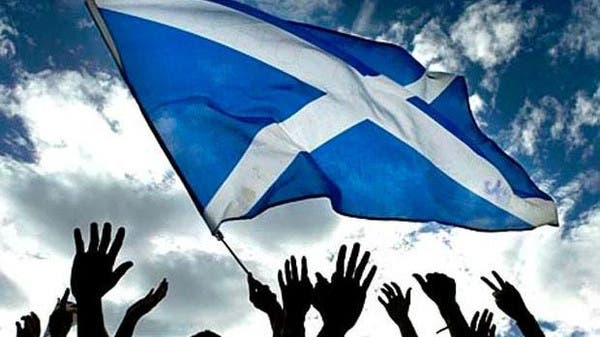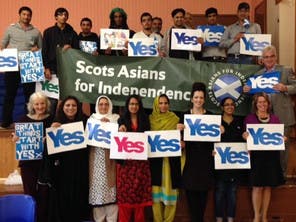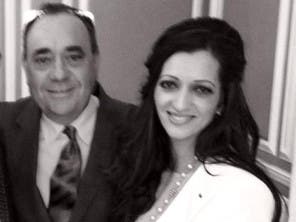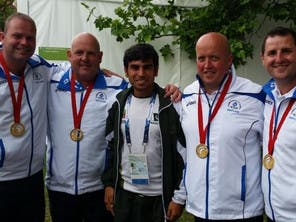Scottish Muslims push for independence ahead of vote

Most Scottish Muslims favor independence, with a major motivation
being the ‘unlawful’ war in Iraq. (Photo courtesy: Twitter)
By Jenny McCall
| Special to Al Arabiya News
Wednesday, 17 September 2014
Wednesday, 17 September 2014
Polls show that it is too close to call, but that most Scottish Muslims, as well as other ethnic minorities, are likely to vote yes. Out of almost 6 million people in Scotland, 1.4% are Muslim.
According to a poll by Asian radio station Awaz FM, 64% of Asians in Scotland, mostly Muslim, would vote for independence.
Tasmina Ahmed-Sheikh, a lawyer from Glasgow and national women’s officer for the pro-independence Scottish National Party, says Scotland needs to control its own foreign policy and immigration issues.
Policies imposed on Scotland by the UK government have caused a surge in popularity for far-right groups such as the UK Independence Party, she added.
“UKIP have managed to gain ground south of the border. We don’t want this in Scotland,” she said.
“We have a white paper called ‘Scotland’s Future: Your Guide to an Independent Scotland,’ and it outlines that people living legally in Scotland at the time of independence can remain.”
Ahmed-Sheikh says independence will lead to the closure of immigration detention centers such as Dungavel, located in Scotland.
“Scottish Muslims have a voice and it counts. For anyone still undecided, their vote should be yes,” she said.
Many Scottish Muslims say the UK government acted unlawfully in its wars in Iraq and Afghanistan.
Ahmed-Sheikh said: “I speak to Muslims all the time across Scotland, and there is a strong feeling that being independent will allow us more control over foreign policy. No longer will we be led into ‘illegal wars’.”
Nighet Riaz, the main facilitator for the Scottish Asian independence campaign, said: “Voting yes in the referendum will allow Scotland to be a beacon of hope across the globe. We will be peace-makers, as it means we can control our foreign-policy decisions and won’t be led into conflict unnecessarily.”
Riaz says this is not about being anti-English, keeping the pound is a non-issue, and this is a natural evolution for Scotland.
“We have contributed to the UK, and yes we should keep the pound. There are other countries that use the dollar.”
With Scotland hosting the recent Commonwealth Games, the sense of nationalism displayed during the competition appears to have heightened the desire for independence.
Mohammed Shahzad, who lives in Scotland and represented Pakistan in the games, plans to vote yes.
Like most Scottish Muslims, he wants the country to be able to control its own resources and wealth.
“The vast majority of my Muslim friends here in Scotland will be voting yes in the referendum. We want an independent Scotland,” he said.
“This country is so friendly to other cultures and nationalities, and a lot more accepting of the Muslim community versus the rest of the UK.”
Shahzad believes that the first few years of independence will be tough. However, his real fear is a “negative backlash” if a majority vote to remain in the UK, because of “the fact that we are even thinking about independence.”
He said he did not feel threatened by Scottish nationalism during the Commonwealth Games. “I loved every minute of the competition, and the Scottish people wore their national colours. It was great to see.”
However, some Scottish Muslims see a potential dark side to nationalism.
“We need to stick with the UK... The world is moving in such a way that nationalism could mean racism,” said Yasar Yousafzai, a PHD student from Glasgow University, adding that Scotland is the most accepting place he has ever lived.
He said separation could also lead to funding cuts in academic research within universities.
Dr Imran Ahmad, a clinical lecturer at Glasgow University, also says separation could lead to a decrease in university funding as well as healthcare resources.
“It’s not been explicitly said, but it has been implied that we get better funding for research being part of the UK,” he said.
However, Ahmad disagrees that nationalism could lead to racism. “I think Scotland is very open, there will not be an increase in segregation if we become independent.”
Last Update: Wednesday, 17 September 2014 KSA 15:41 - GMT 12:41
Labels: Muslims, Scotland, Secession, United Kingdom




<< Home